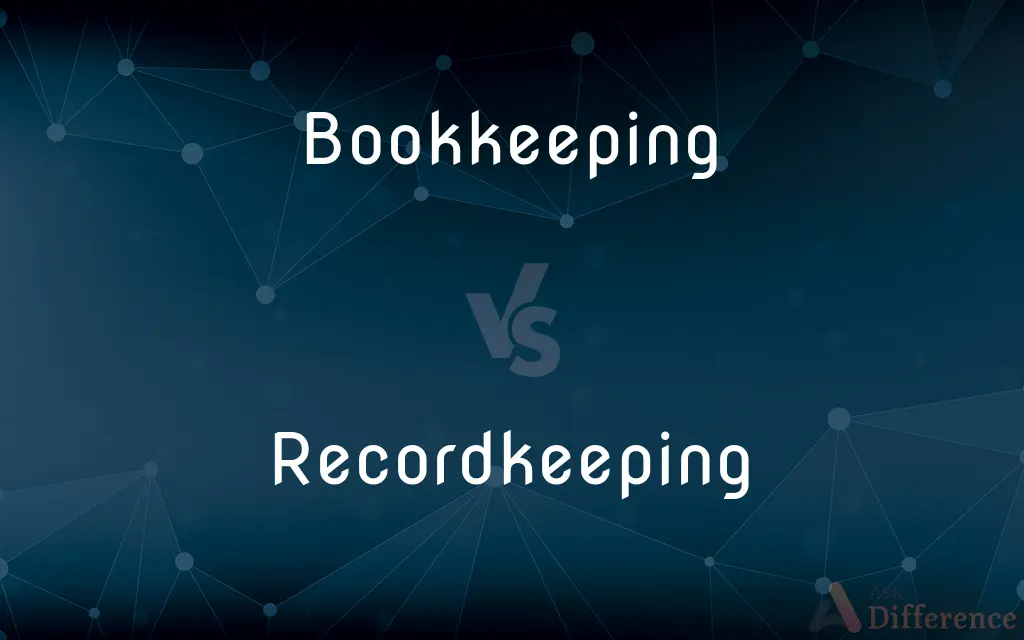Bookkeeping vs. Recordkeeping — What's the Difference?
By Tayyaba Rehman & Maham Liaqat — Updated on March 10, 2024
Bookkeeping involves recording and managing financial transactions for a business, while recordkeeping is broader, encompassing the maintenance of all types of records, including financial, legal, and administrative.

Difference Between Bookkeeping and Recordkeeping
Table of Contents
ADVERTISEMENT
Key Differences
Bookkeeping is a subset of accounting that focuses specifically on the day-to-day financial transactions of a business, such as purchases, sales, receipts, and payments. It involves categorizing each transaction and recording it in a systematic manner, typically using ledgers and accounting software. Recordkeeping, on the other hand, includes the organization and storage of any kind of record or document, not limited to finances, which can include employee records, contracts, compliance documents, and more.
The primary goal of bookkeeping is to ensure accurate financial reporting and facilitate the preparation of financial statements. It serves as the groundwork for accounting, which involves interpreting, classifying, analyzing, reporting, and summarizing financial data. In contrast, the aim of recordkeeping is to maintain a comprehensive and organized system of records for various purposes, including legal compliance, historical documentation, and efficient operation of the organization.
Bookkeeping requires a knowledge of financial principles and accounting conventions, focusing on numerical accuracy and financial data management. It's essential for financial analysis, budgeting, and strategic decision-making. Whereas recordkeeping demands organizational skills and an understanding of the legal and administrative requirements governing the records, ensuring they are accurate, accessible, and secure.
In terms of tools and processes, bookkeeping often uses accounting software like QuickBooks or Xero, which helps in tracking financial transactions and generating reports. Recordkeeping, however, may involve various systems, including document management software, databases, and physical filing systems, to manage the wide range of records.
While bookkeeping is a critical function within the finance department or for a finance professional, recordkeeping responsibilities may be distributed across various departments within an organization, with specific roles dedicated to managing different types of records, such as human resources for employee records or legal departments for contracts and compliance documents.
ADVERTISEMENT
Comparison Chart
Scope
Financial transactions
All types of records (financial, legal, administrative, etc.)
Purpose
Ensure accurate financial reporting, aid in financial statement preparation
Organize and store records for compliance, historical documentation, efficient operation
Skills Required
Financial principles, accounting conventions
Organizational skills, understanding of legal/administrative record requirements
Tools and Processes
Accounting software, ledgers
Document management software, databases, physical filing systems
Department
Finance
Various departments (HR, legal, etc.)
Compare with Definitions
Bookkeeping
The process of recording financial transactions in a systematic manner.
Bookkeeping ensures every sale and purchase is accounted for in the company's ledger.
Recordkeeping
Encompasses a wide range of record types beyond finances.
The company's recordkeeping system includes employee records, contracts, and operational documents.
Bookkeeping
Essential for preparing accurate financial statements.
Without diligent bookkeeping, financial statements could be misleading.
Recordkeeping
Requires understanding of legal and administrative requirements.
Recordkeeping practices must comply with laws governing data retention and privacy.
Bookkeeping
Involves categorizing each transaction for accurate reporting.
Proper bookkeeping categorizes expenses separately from revenues.
Recordkeeping
May use diverse systems for managing records.
The organization employs a digital document management system for efficient recordkeeping.
Bookkeeping
Requires knowledge of accounting conventions.
Bookkeeping practices must align with generally accepted accounting principles (GAAP).
Recordkeeping
The maintenance of records for various purposes, including compliance and operation.
Effective recordkeeping is crucial for meeting regulatory requirements.
Bookkeeping
Often facilitated by accounting software.
The company uses Xero for its bookkeeping to streamline financial transaction management.
Recordkeeping
Involves organizing and storing records systematically.
The recordkeeping protocol ensures all documents are easily accessible and secure.
Bookkeeping
Bookkeeping is the recording of financial transactions, and is part of the process of accounting in business and other organizations. It involves preparing source documents for all transactions, operations, and other events of a business.
Recordkeeping
The creation, collection and management of records, especially of a business or governmental nature.
Bookkeeping
The practice or profession of recording the accounts and transactions of a business.
Bookkeeping
(accounting) The skill or practice of keeping books or systematic records of financial transactions, e.g. income and expenses.
Bookkeeping
(computing) General tasks for maintaining a system.
Bookkeeping
Present participle of bookkeep
Bookkeeping
The art of recording pecuniary or business transactions in a regular and systematic manner, so as to show their relation to each other, and the state of the business in which they occur; the art of keeping accounts. The books commonly used are a daybook, cashbook, journal, and ledger. See Daybook, Cashbook, Journal, and Ledger.
Bookkeeping
The activity of recording business transactions
Common Curiosities
Why is bookkeeping important for a business?
Bookkeeping is crucial for accurate financial tracking, budgeting, and strategic planning, forming the basis for sound financial management.
Can recordkeeping include financial records?
Yes, financial records are a component of recordkeeping, along with other types of documents and records.
Do bookkeeping and recordkeeping require professional certification?
Bookkeeping may not always require certification, but professional accreditation like a Certified Bookkeeper (CB) designation can enhance credibility. Recordkeeping professionals might benefit from certifications in records management or specific document management systems.
How does technology impact bookkeeping and recordkeeping?
Technology, especially digital document management and accounting software, has significantly streamlined both bookkeeping and recordkeeping, improving accuracy and accessibility.
How often should bookkeeping and recordkeeping tasks be performed?
Bookkeeping is typically done daily or weekly to keep up with financial transactions, while recordkeeping tasks may vary depending on the type of record and regulatory requirements.
What is the difference between bookkeeping and accounting?
Bookkeeping is the recording of financial transactions, a foundational part of the broader accounting process, which includes analyzing and interpreting these transactions to inform business decisions.
How do regulatory changes affect bookkeeping and recordkeeping?
Regulatory changes can necessitate adjustments in both bookkeeping and recordkeeping practices to ensure compliance with new laws and standards.
What role do bookkeeping and recordkeeping play in audits?
Both are critical during audits; bookkeeping provides the financial transaction trail, while recordkeeping ensures all relevant documents are organized and available for review.
Is digital recordkeeping more secure than traditional methods?
Digital recordkeeping can offer enhanced security features like encryption and access controls, but it also requires robust cybersecurity measures to protect against data breaches.
Can small businesses manage bookkeeping and recordkeeping without dedicated staff?
Small businesses can manage these functions without dedicated staff, often through the use of software tools, but as they grow, specialized skills may become necessary.
Share Your Discovery

Previous Comparison
Plaster vs. Screed
Next Comparison
Flash vs. MeatAuthor Spotlight
Written by
Tayyaba RehmanTayyaba Rehman is a distinguished writer, currently serving as a primary contributor to askdifference.com. As a researcher in semantics and etymology, Tayyaba's passion for the complexity of languages and their distinctions has found a perfect home on the platform. Tayyaba delves into the intricacies of language, distinguishing between commonly confused words and phrases, thereby providing clarity for readers worldwide.
Co-written by
Maham Liaqat















































